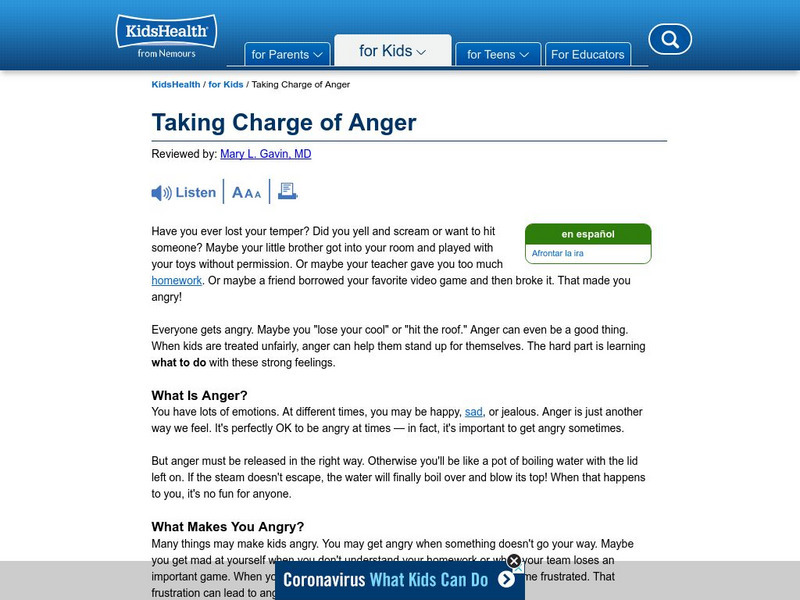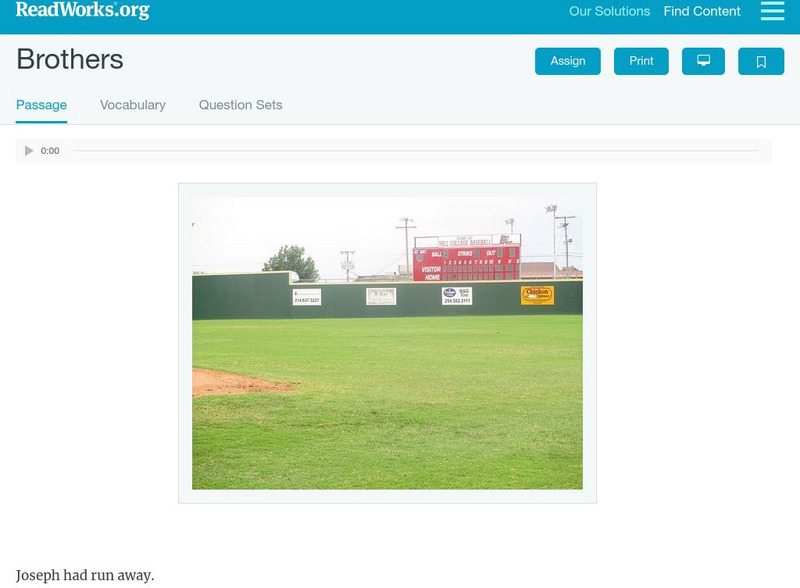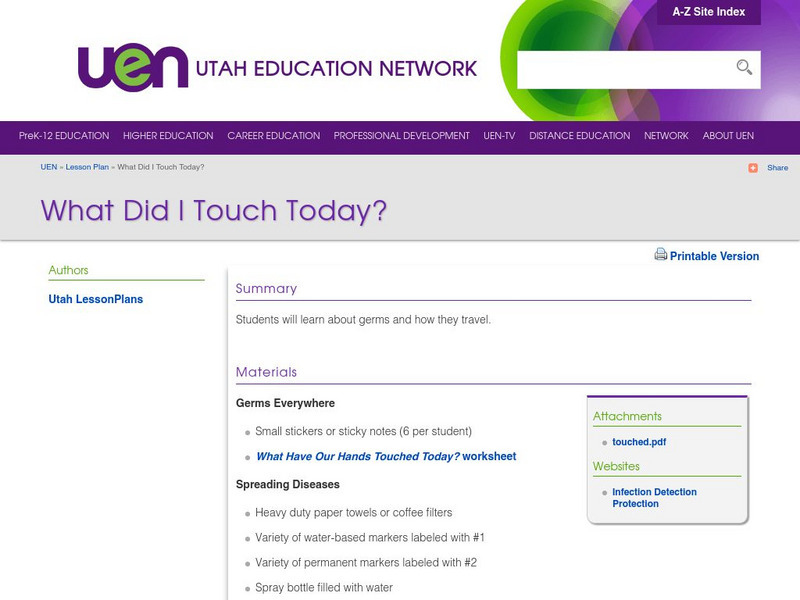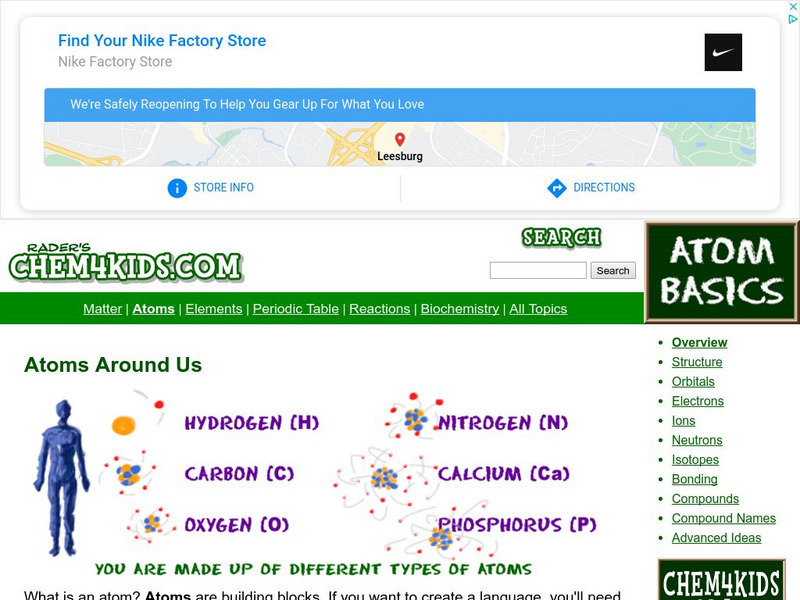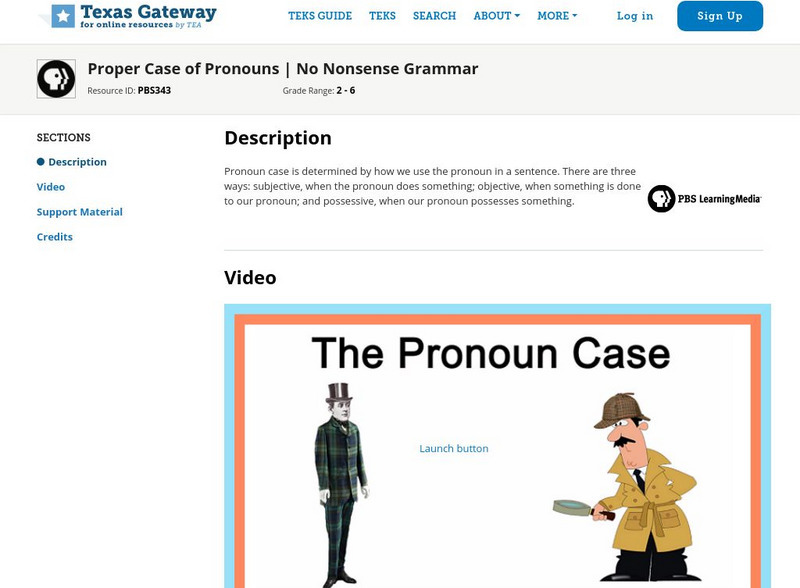Chem4kids
Chem4 Kids: Symbols in Chemical Equations
Chem4Kids! provides an overview of the symbols representing numerical values in chemical equations. Each symbol is defined and described.
Chase Young, PhD
Dr. Chase Young, Ph D: Reader's Theater Script: Brave Irene [Pdf]
A reader's theater script for William Steig's children's book, Brave Irene, is provided on these pages. Four character roles are needed in this activity.
Chase Young, PhD
Dr. Chase Young, Ph D: Reader's Theater Script: Cinderella Bigfoot [Pdf]
A reader's theater script for Mike Thaler's children's book, Cinderella Bigfoot, is provided on these pages. Fifteen character roles are needed in this activity.
Chase Young, PhD
Dr. Chase Young, Ph D: Reader's Theater Script: Evil Lurks [Pdf]
A reader's theater script for a suspenseful piece, Evil Lurks, is provided on these pages. Six character roles are needed in this activity.
Chase Young, PhD
Dr. Chase Young, Ph D: Reader's Theater Script: The King of the Wild Frontier [Pdf]
A reader's theater script for The King of the Wild Frontier, a short biography of Davy Crockett. Five character roles are needed in this activity.
Chase Young, PhD
Dr. Chase Young, Ph D: Reader's Theater Script: Rump and Ugla [Pdf]
A reader's theater script for the modern fairy tale, Rump and Ugla, is provided on these pages. Six character roles are needed in this activity.
PBS
Pbs Kids: Science Rocks: Air Lift
Through this experiment, students are challenged to lift a book (and other items) with just air. Requires simple household items, gallon-size, zipper-lock plastic bag, book, pencil, drinking straw, and tape.
PBS
Pbs Kids: Design Squad: Build: Build a Better Lunchbox
Follow the directions to build a lunchbox that will keep a frozen treat from melting.
PBS
Pbs Kids: Plum Landing: Invaders
This game is based on the PBS Kids' series, Plum Landing. Students will read various informational texts about invasive species. Then students will attempt to rid various regions of their invasive species.
US House of Representatives
Office of the Clerk: What Is Congress
Introduce Congress and it's main responsibility with these simple activities. Included is a simple explanation of Congress, worksheets, and an easy game.
PBS
Pbs Kids: Don't Buy It: Get Media Smart!: Buying Smart
Play a Price is Right style game and learn about merchandising. You will also find lots of information about advertising, brand names, and product value.
Online Writing Lab at Purdue University
Purdue University Owl: Exercise: Prepositions of Direction: To, on (To), in (To)
This Purdue University OWL (Online Writing Lab) provides practice with prepositions of directions (to, on, onto, in, into).
US Department of Energy
Need Project: Solar Oven [Pdf]
An introduction and activity to engage students in building a solar oven.
Other
Cyber Smart!: Whose Is It, Anyway? [Pdf]
A worksheet to accompany a lesson where students learn that, although the Internet makes it very easy, copying others' work and presenting it as one's own is unethical, unfair, and unacceptable.
E-learning for Kids
E Learning for Kids: Science: Denmark: How Does Light Help Us See Things?
Isabella and Amalie are in Copenhagen, and they saw a periscope in the water. Join them, and find out what this is all about. This module discusses how to use a periscope, what light sources are, and how light impacts shadows.
Curated OER
Kids Health: Dealing With Anger
What happens when you feel angry? Do you throw things? Yell? Stomp your feet? Anger is an emotion that we all feel, but we deal with it in different ways. If you would like some ideas on ways to handle your anger, or how to tell if...
TES Global
Tes: Nouns: Revision: Explanation Booklet
[Free Registration/Login Required] This seven-page resource provides definitions for different categories of nouns: common, proper, collective, hyphenated, compound, and abstract. Numerous examples with pictures are provided for each...
Read Works
Read Works: Passages: Learning to Skateboard
[Free Registration/Login Required] Students read a literary text about the relationship between a brother and a sister and answer questions on comprehension, main idea, text evidence, and more. Links to a paired text and paired text...
Other
National Council for the Social Studies: Fear, Panic, and Injustice
What did it feel like to have to leave your home and possessions to live in a camp during WWII because you were a Japanese-American? Young scholars will understand the climate of fear during this time and develop empathy toward the...
Utah Education Network
Uen: What Did I Touch Today?
For this lesson, students will assess what items in the classroom are touched the most. Students will investigate germs and distinguish between communicable and noncommunicable diseases.
Chem4kids
Chem4 Kids: Atoms
This site provides a detailed overview of atoms. Content explores an atom's structure, as well as what ions are, how atoms bond, what compounds are (including how to name compounds), and what isotopes are.
Annenberg Foundation
Annenberg Learner: Patterns in Mathematics: How Many Valentines?
Students look for patterns to determine how many valentines will be distributed in a class of 28 students. After trying the problem, they can look at several other methods that could be used and compare the answer they got. There is also...
Texas Education Agency
Texas Gateway: Proper Case of Pronouns | No Nonsense Grammar
Pronoun case is determined by how we use the pronoun in a sentence. There are three ways: subjective, when the pronoun does something; objective, when something is done to our pronoun; and possessive, when our pronoun possesses something.
Lin and Don Donn
Mrdonn.org: Daily Life in Olden Times: Southeast Cherokee Indians
Lesson and resources on the history of the Cherokee Indian tribe.



![Dr. Chase Young, Ph D: Reader's Theater Script: Brave Irene [Pdf] Activity Dr. Chase Young, Ph D: Reader's Theater Script: Brave Irene [Pdf] Activity](https://d15y2dacu3jp90.cloudfront.net/images/attachment_defaults/resource/large/FPO-knovation.png)






